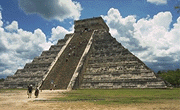

Unit 13

English 203:
Literature of the NonWestern World
 |

Unit 13 |

English 203: Literature of the NonWestern World |
| Introduction | .Explication | Questions | Review |
Review:
In this course, we unfortunately only get a sample taste of the literature of nonWestern cultures. This is especially true of India & Native American writing. In both cases, we found rather nonliterary writing. Because we only have a tiny sample of the writing from cultures that flourished for thousands of years, our editor understandably tried to pick texts that distilled much of a particular culture's values. These are most often found in religious texts. Even though the religious cultures of Asia are unfamiliar to most of us, they are accessible. Ancient Native American literature & culture are not accessible; or if they are, they are accessible only in fragments to archeologists & linguists.
We did not have a chance to read contemporary East Indian or Native American writing. Both cultures are currently in the midst of a kind of renaissance or literary boom. Penguin Press publishes many contemporary Indian novels. The University presses of New Mexico & Arizona publish many contemporary Native American novels. If you don't find these at your bookstore, you can find them at Amazon. Don't forget to look for Andean music as well. The group Sukay is good. Search for such authors as:
If you enjoyed this course, WT has other literature
courses available on-line. Well, only one at the moment, English
201: Masterpieces in Western World Literature. That course studies
works by Homer, Aeschylus, Sophocles, Euripides, Dante, Boccaccio, &
Cervantes. The second course in this sequence, English 202 will soon
be available on line.